Celebrate strides in LGBTQ+ representation with 23 shows you can watch right now.
There’s no time like Pride month to celebrate the recent bounty of diverse LGBTQ+ characters gracing our TV screens. While big-screen blockbusters hesitate to label characters as anything but straight (at least not until after the movie’s come out, likely for fear of losing money in global markets), viewers at home are able to see their identities, love stories, and struggles reflected on screen more than ever, if they know where to look. I’d say we as viewers are lucky, but countless people have worked very hard to get to this point, and luck had little to do with it. And while the television industry still a way to go in terms of fully representing its viewers–intersectional representations are still more scarce, and the “bury your gays” trope doesn’t seem to be going anywhere–there’s plenty of LGBTQ-friendly content to check out in the meantime.
If you’re ready to kick back and celebrate Pride with a good old-fashioned binge-watch, consider checking out one of the following 23 shows. Keep in mind that this list isn’t exhaustive. It only includes currently airing series, which means some great, recently departed ones like Orphan Black, Halt and Catch Fire, Sense8, and The Fosters aren’t included. I’ve also skipped out on shows whose queer representation comes in the form of characters who aren’t canonically ‘out’ to the audience (sorry, Will from Stranger Things), once-great shows that have lost their luster or their gay plots (sorry Shameless, Orange is the New Black, and The 100), shows that use gay stereotypes for cheap laughs (you know who you are), and shows that are just altogether unsatisfying (not that sorry, 13 Reasons Why).
Also, this list doesn’t include reality shows, but if you’re a human being with a pulse you should definitely still go watch Queer Eye.
Billions (2016-present)

For two years now, this big, brassy Showtime drama with a has slowly been converting skeptics to fans, thanks largely to an exceptional cast headed up by Paul Giamatti and Damian Lewis. Come for the melodrama, stay for Asia Kate Dillon as Taylor Mason, who is commonly cited as the first non-binary character on American television (though for what it’s worth, I think The Killing’s Bullet was also gender-fluid or non-binary). Dillon was introduced in the second season of the corporate thriller but was bumped to a larger role in its most recent (and best-reviewed) third season.
Where to watch: Directly on Showtime or through Showtime’s streaming add-on for Hulu or Amazon Prime.
Bojack Horseman (2014-present)

On the surface, Todd Chavez’s sexuality seems like a very minor part of this emotional Netflix dramedy about a washed-up talking horse. Played by Aaron Paul, the goofy human character is often on the periphery of a Bojack-centric story, but when the narrative perspective does pull back to focus on him–as when he eventually comes out as asexual–what we are given is earnest and lovely. Todd is still trying to figure out what that label means to him (at this point, he still isn’t out to several main characters), but so far it looks like series creator Raphael Bob-Waksberg has been treating Todd’s story with his signature thoughtful consideration.
Where to watch: Netflix.
The Bold Type (2017-present)
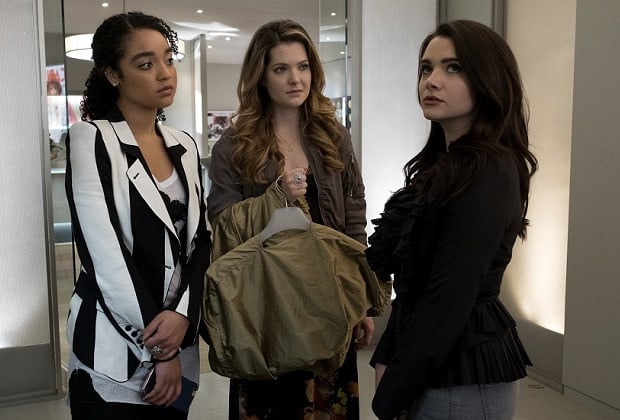
This Freeform channel show has been compared positively to Sex and the City, and though it follows a group of young women working at a New York City female-centric magazine, The Bold Type is wonderfully modern in many ways that Carrie Bradshaw’s 90s upper-crust feminist clique are not. Take for example Aisha Dee’s character, Kat Edison, a woman of color questioning her sexuality when she meets Adena, an openly lesbian Muslim photographer. Dee is chronically great in shows that are over before you know it, including Sweet/Vicious and an arc of Channel Zero, so here’s hoping The Bold Type has the staying power this up-and-comer deserves.
Where to watch: For free on the Freeform website and on Crackle.
Broad City (2014-present)
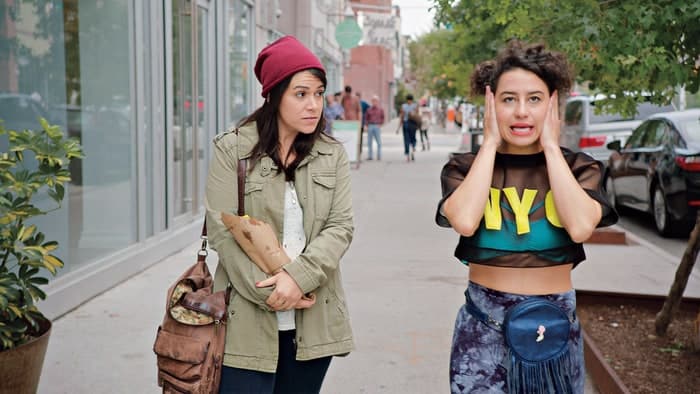
Jewish New Yorker Ilana Wexler (Ilana Glazer) is a lady of many hidden talents, including finding creative hiding spots for weed, ignoring serious food allergies, and maintaining a job while doing no work at all. A true stoner inspiration and one half of Comedy Central’s best dynamic duo (along with Abbi Jacobson), Ilana is also casually not-so-straight. Though we know early on about her vision of a future where “everybody’s gonna be like, caramel and queer,” her sexuality first comes to the forefront in a reliably out-there season two episode when she falls for her doppelganger (Alia Shawkat). The gut-bustingly funny show only has one more season to go before it wraps, so catch up on all the hijinks now.
Where to watch: Hulu.
Brooklyn 99 (2013-present)
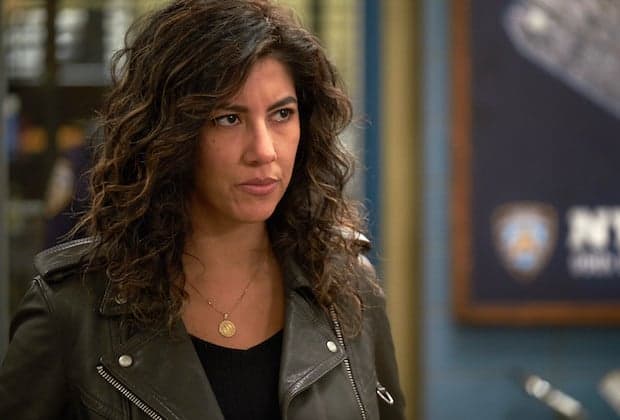
Post-The Office, Mike Schur shows have been a beacon of life-affirming sweetness and levity, and GLAAD award winner Brooklyn 99 is no exception. The police station workplace comedy recently made the jump from Fox to NBC after a fraught, super-brief cancellation, and its representation of a realistic queer experience is a major factor in fans’ commitment to the show. Last season included an incredible arc in which detective Rosa Diaz (Stephanie Beatriz) begrudgingly came out as bisexual, first to her coworkers and then to her family. When her family’s response is less than welcoming, openly gay police Captain Holt (Andre Braugher) gives her a pep talk that’ll make you reach for a tissue. This storyline surrounding Rosa’s newly revealed bisexuality is empowering for a lot of reasons, one of which is Schur and company’s decision to give it a place of honor in the show’s chronology (the 99th and 100th episodes) while also continuing to flesh it out in the back half of the season.
Where to watch: Hulu.
Crazy Ex-Girlfriend (2015-present)
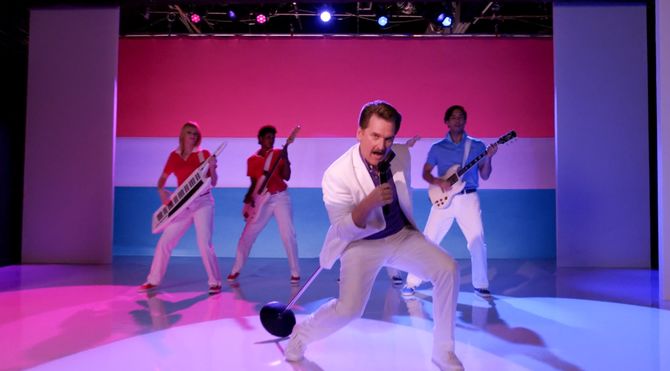
This zany, funny, and often deeply emotional musical show has done something that few other shows have attempted until recently: it’s ignored the traditional (and unrealistic) trope of including just one token LGBTQ+ character. Instead, over the course of its three seasons, multiple main characters have come out as bisexual to varying levels of fanfare. Most memorably, Daryyl (Pete Gardner) delivers his good news in a rousing song-and-dance number called “Gettin’ Bi,” which casually and joyfully corrects several common misunderstandings and stereotypes about bisexuality–many of which had been perpetuated by other TV shows.
Where to watch: Netflix, with the latest episodes available on the CW website.
The CW’s DC universe (AKA “the Arrowverse”) (2012-present)

The fact that Supergirl, Legends of Tomorrow, Black Lightning, Arrow, and The Flash all feature significant LGBTQ+ representation and have maintained intensely loyal viewership should be a lesson to studio execs who still think gay sci-fi and superhero stories aren’t marketable. Supergirl is probably the most noteworthy of the bunch, as Alex Danvers’ sensitively handled coming out storyline inspired a legion of impassioned shippers, young LGBTQ+ fans, and unassuming viewers alike. Black Lightning also deserves massive props for introducing a badass superhero who happens to be a QWOC (queer woman of color), Anissa (Nafessa Williams) AKA Thunder. Now can we finally talk about getting that Dora Milaje love story on screen?
Where to watch: Netflix, with the latest episodes available on the CW website.
Dear White People (2017-present)

Justin Simien’s half-hour show is a biting inside look at the microcosm of a historically white modern Ivy League college through the personalized POVs of each member of a group of Black students. Each episode is better than the last, and season two is quippier, sleeker, and more emotionally impactful than the first. Awkward student journalist Lionel (DeRon Horton) is the first gay character we meet, and although other students’ sexualities are revealed later, his cringe-worthy yet honest journey to self-acceptance and confidence gets the most screen time. This show hasn’t been picked up for a third season yet, so right now your viewership counts.
Where to watch: Netflix.
Grey’s Anatomy (2005-present)
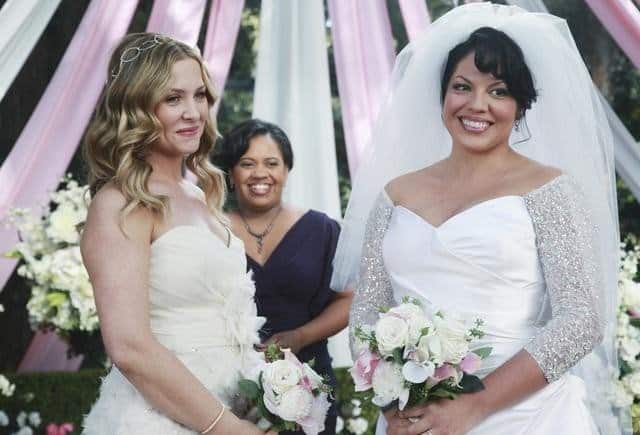
Has Shonda Rhimes’ flagship series been running for a half-dozen too many years? Probably. Does it still have excellent, complex queer representation on the regular? Definitely. Many of the show’s best moments revolve around Callie Torres (Sara Ramirez), a spirited woman who starts off as a straight-identifying resident and ends up a successful bisexual surgeon and mother. Callie is the longest-running LGBTQ+ character in history, and her and Arizona’s wedding was a historic prime-time moment. Callie may be gone, but Rhimes still consistently cultivates tear-jerking gay-friendly moments via patient-of-the-week storylines involving regular LGBT+ people looking for love and understanding.
Where to watch: Netflix.
Grown-ish (2018-present)

Remember earlier when I mentioned the rampant misinformation, often perpetuated by pop culture, that surrounds the bisexual community? Grown-ish not only knows about these stigmas but also owns up to and interrogates them. A spinoff of ABC’s successful family sitcom Black-ish, Grown-ish follows eldest daughter Zoey (Yara Shahidi) through her first year of college, where she meets Nomi (Emily Arlook). From here, the show addresses everything from being half-closeted to having your personhood called a “phase,” to the double standards that exist within perceptions of bisexual men and women.
Where to watch: Hulu.
The Handmaid’s Tale (2017-present)

Margaret Atwood’s painfully detailed anti-women dystopian classic has found acclaim on Hulu with an even more grueling–yet also more rewarding–retelling. By turns impressionistic and pulse-pounding, The Handmaid’s Tale might be the most felicitous political thriller in recent years. Let me be clear here: good things don’t happen to queer characters in Gilead, the post-America hyper-patriarchy in which the show is set. Samira Wiley and Alexis Bledel play two characters who are constantly and horribly put through the wringer because of their sexual preferences. Still, this show is a powerhouse, telling stories of persecution that feel immediate and necessary.
Where to watch: Hulu.
Jane the Virgin (2014-present)
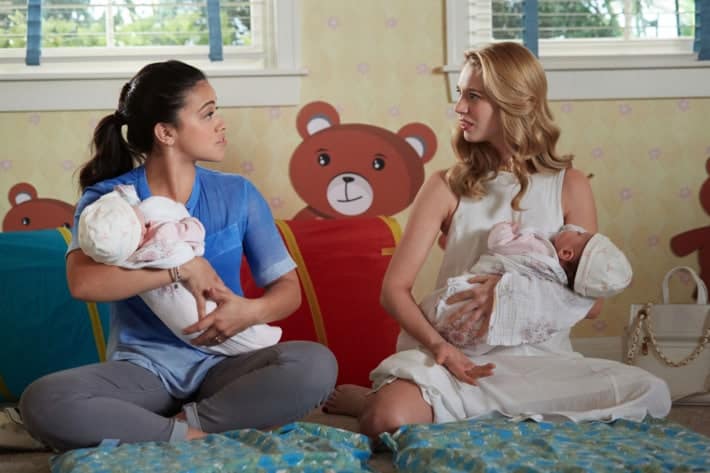
If you haven’t seen Jane the Virgin, you’ve probably at least heard someone compare it to a telenovela. The CW show certainly has all the elements–Evil twins! Faked deaths! Love triangles!–but the more important part of the show is also the trickier part to explain. Jane the Virgin plays with telenovela plots, yes, but it does so with an authenticity and delicate care for its characters that even some of the most prestigious straight-laced dramas don’t manage to pull off. Despite their larger-than-life situations, Jane and her friends and family manage to come across as real and deeply empathetic. So when a female series regular fell in love with a woman this season, it didn’t feel sensationalized, but rather like a natural next step on her personal journey.
Where to watch: Netflix, with the latest episodes available on the CW website.
Killing Eve (2018-present)

Alright, we have a couple of gay superheroes now (see “Arrowverse” above), so why not an iconic openly LGBTQ+ villain? Phoebe Waller-Bridge’s BBC series seems to be acutely aware of the way pop culture has historically villainized queerness and intentionally makes its central antagonist–an Eastern European assassin who is literally named Villanelle (Jodie Comer)–complex and surprising at every turn. Comer is aces as a confident, sadistic, and playful killer who comes after her latest obsession, MI5 agent Eve (Sandra Oh), full tilt and with a romantic gleam in her eye. Eve’s feelings remain to be seen, but the exceptionally executed first season leaves plenty of room for non-hetero interpretation.
Where to watch: Purchase episodes on Amazon, or wait until it hits Hulu later this year.
Master of None (2015-present)

Lena Waithe has (rightfully) been everywhere lately, from working behind the camera on The Chi to popping up in Dear White People and voicing AT&Ts latest ubiquitous ad campaign. Her breakout, though, came on Aziz Ansari and Alan Yang’s artistic take on Millennial anxieties and desires, Master of None. Waithe is dynamic as Denise, the lesbian childhood best friend of protagonist Dev (Ansari). The season two episode “Thanksgiving” is a series high, following Denise and Dev through several family holidays as Denise processes her sexuality, comes out to her mother, and deals with the uncomfortable, ongoing feeling that her identity is not fully embraced.
Where to watch: Netflix.
Mr. Robot (2015-present)

You wouldn’t think that USA channel’s edgy techno-thriller, set during a worldwide economic apocalypse, would take the necessary time to develop characters’ nuanced sexual identities. Yet Sam Esmail proves our assumptions wrong once again by including a set of characters that checks off every letter of the LGBT initialism in a way that doesn’t feel forced. Lesbian FBI agent? Check. Gay dad-type boss? Check. At least two bi- or pansexual characters, both of them shady AF but also super engrossing? Check. A mysterious trans cyber-terrorist and foreign diplomat played with elegant chilliness by B.D. Wong? Check and check.
Where to watch: Amazon Prime.
One Day at a Time (2017-present)

Have you met Elena Alvarez? She’s a Cuban-American teen with a fiery attitude, a heart for activism, and a thing for girls. She’s also just one of several characters capable of instantly lighting up your life when you choose to give in to the wildly enjoyable experience of watching One Day at a Time. Elena, played by Isabella Gomez, is part of a loving if overbearing family which also includes a single military veteran mom, a hip little brother, and a tradition-loving grandmother played by none other than Rita Moreno. Her enthusiastic journey toward self-acceptance provides plenty of teaching moments for her family and audiences alike.
Where to watch: Netflix.
Queen Sugar (2016-present)

Ava Duvernay’s Southern family drama airs on Oprah’s network and has received attention for Duvernay’s decision to employ only female directors, including Julie Dash and Cheryl Dunye. The series follows three adult siblings, including Nova (an always great Rutina Wesley), as they navigate life after inheriting their father’s farm in Louisiana. The series never shies away from controversy, but it portrays Nova’s sexuality–she dates both men and women–in a refreshingly low-key way. A later guest role featured a trans actor playing a trans man, something which even many of the most socially conscious shows fail to do.
Where to watch: Hulu.
Schitt’s Creek (2015-present)

A classic riches-to-rags comedy and a bit of a Christopher Guest film cast reunion (Catherine O’Hara and Eugene Levy star), Schitt’s Creek is one of those shows that’s flown far under most peoples’ radar (it airs on a channel called Pop, formerly T.V. Guide Network) but deserves to be Netflix binged immediately. Privileged adult son David (Dan Levy) identifies as pansexual and memorably explains it using wine metaphors: “I do drink red wine. But I also drink white wine. And I’ve been known to sample the occasional rosé. And a couple summers back I tried a merlot that used to be a Chardonnay, which got a bit complicated. I like the wine and not the label. Does that make sense?”
Where to watch: Netflix.
Shadowhunters (2016-present)

News of this Freeform series’ cancellation earlier this month was met with outrage and activism from fans of the popular Mortal Instruments young adult book series and this three-season adaptation. A fan petition to revive the show garnered over 100,000 signatures, and fans also made $9000 worth of donations to The Trevor Project in support of the show’s positive portrayal of LGBTQ+ characters. Still, the series looks set to end in early 2019, so enjoy the flirty, supernatural love between demon hunter Alec (Matthew Daddario) and warlock Magnus (Harry Shum Jr.) while you can.
Where to watch: Hulu.
She’s Gotta Have It (2017-present)

Spike Lee rebooted his own film for this Netflix original series last year, and this time around Nola’s bedroom antics aren’t limited to male partners. Calling herself “sex-positive, polyamorous [and] pansexual,” Nola’s (DeWanda Wise) attempts at free love and independence have so far involved three men (Jamie, Mars, and Greer) and one woman (Opal). Characters in the show dismiss Nola’s bisexuality as a side effect of her generally messy lifestyle, but these moments feel more like purposely written character flaws than failings of the show itself. Despite largely positive reviews, She’s Gotta Have It didn’t receive as much attention as most Spike Lee joints do, perhaps due to its awkward release date during early Oscar season. Here’s hoping for a second season that gives Nola’s and Opal’s identities more room to grow.
Where to watch: Netflix.
Star Trek: Discovery (2017-present)

People have been waiting for a gay couple in Star Trek for decades (Spock and Kirk were one of the first well-documented slash ships), and with Star Trek: Discovery, they finally got one. If you’ve been fed up by gay representation since Tara Maclay took a stray bullet to the chest, you should know before heading into the series that the show doesn’t quite avoid the “bury your gays” trope, but also doesn’t fully play into it either. The sci-fi series has been praised for its inclusivity and creativity, but when a beloved gay couple (played by Anthony Rapp and Wilson Cruz, who have both previously played other iconic gay characters) was torn apart by a shocking twist earlier this year, fans weren’t having it. The then-showrunners quickly stated that this time-and-space conquering love story was not over, and viewers are still eagerly awaiting the promised resurrection.
Where to watch: CBS All Access.
Steven Universe (2013-present)

It’s a cute, musical, all-ages cartoon about a boy and a bunch of ladies (some of whom are gay) saving the world with the power of gems and friendship. What more could you ask for?
Where to watch: Hulu.
Will & Grace (1998-2006, 2017-present)

Have you heard about the ‘90s sitcom reboot airing on network TV this year that hasn’t been a tremendous, crashing-and-burning letdown? Although the original show’s portrayal of gay characters had its flaws (it perpetuated some stereotypes even as it shattered others), Will & Grace was also many viewers’ first-ever exposure to positive portrayals of gay people. The show’s revival is the same as ever in all the ways it needs to be, but its first season also never fully worked through some characters’ issues of arrested development. Still, Will & Grace is quality comfort food, and it’s no surprise that the show has already been renewed for a second and third season.
Where to watch: Hulu or the NBC website.
The post 23 Great Shows You Should Binge During Pride appeared first on Film School Rejects.
0 comments:
Post a Comment